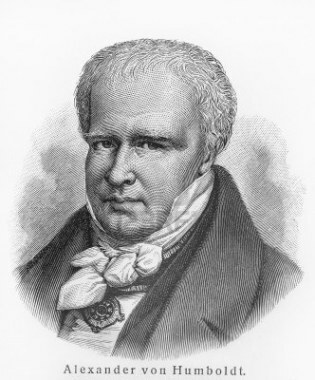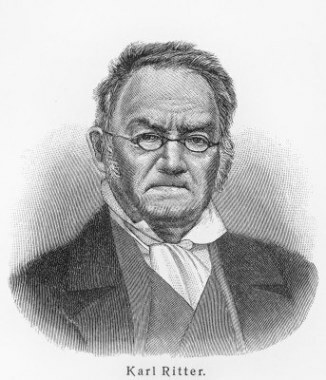Although Geography has been practiced since ancient times, it was in the 19th century that it became consolidated as a modern science, that is, with its own object of study and its scientific method well defined. Alexander Von Humboldt (1779-1859) and Karl Ritter (1779-1859) were responsible for the adoption and exclusive use of reason to explain the space and its physical and human characteristics, breaking with the thoughts hitherto marked by the presence of myths, beliefs and superstitions.
Although both authors integrate, in their work, human elements and natural elements, there was a distinction that was now directed more towards what is conventionally called physical geography (Humboldt), for what is conventionally called human geography (Ritter).
Both also differed in their research method, while Humboldt worked with travel and descriptive observations, Ritter prioritized bibliographic reviews. While the first was a naturist and studied geology and botany, the second worked in the studies of Philosophy and History.
Although the two authors are from different origins and practice different works, both were similar in the pioneering of their works on systematizing geographical thinking, applying and attributing their own methods on the study of landscapes and territories.
Alexander Von Humboldt
Humboldt, born in what is now the territory of Germany and of Prussian family, was a great trailblazer and used their wealth to fund their travels around the world, as well as their research on the different sights. He has been in Europe, Africa, Asia and Latin America, including Brazil. His notes yielded voluminous books and encyclopedias, which contributed significantly to the knowledge of the rest of the world by Europeans. His legacy consisted of themes from various areas, such as: climatology, geomorphology, biogeography and many other fields of knowledge.

Alexander Von Humboldt, one of the most important names in geographical thought
Humboldt's thought was deeply influenced by French rationalism and idealism German philosophical, being a deep adherent of the positivist ideals that were in vogue during the his time. Such influences made him a scientist adept at empiricism, a philosophical thought characterized by considering only experiments and prone to devising universal theories, whose aim was to formulate principles that could fit over any and all reality.
Due to his training and experiences, he associated the human being and life in society with physical, biological and natural characteristics to explain dynamics and relationships spatiotemporal. Such thought was a precursor of the ideals of Friedrich Ratzel, one of the formulators of the geographic determinism.
Karl Ritter
Karl Ritter, unlike Humboldt, did not make great exploratory trips, being a great reader of the scientific knowledge of his time. He sought to maintain a perspective that would integrate societies and natural environments, however, he was concerned to describe the human social environment in more detail. Strongly influenced by Shelling's idealism, he sought to achieve the totality of knowledge about the land from the sums of its parts.

Karl Ritter, considered the creator of Human Geography and studies on social geographic space
It found, however, many difficulties in applying this conception on the social manifestations and behaviors of man, since human activities do not follow a certain pattern, contrary to what happens with some phenomena natural. Therefore, he opposed Humboldt and pointed out that humanity also exerts its influence on nature, mainly through the use of technologies.
His ideas of establishing general laws based on inductions based on local studies markedly influenced Geography of French origin, of which Vidal de La Blache was his main representative.
Despite the criticisms commonly made about these authors, it is important to emphasize that the works of Humboldt and Ritter must be analyzed taking into account taking into account the context in which they were written, when geographical science had not been consolidated and that scientific knowledge passed through another time course.
By Rodolfo Alves Pena
Graduated in Geography
Source: Brazil School - https://brasilescola.uol.com.br/geografia/humboldt-ritter-os-pais-geografia.htm
